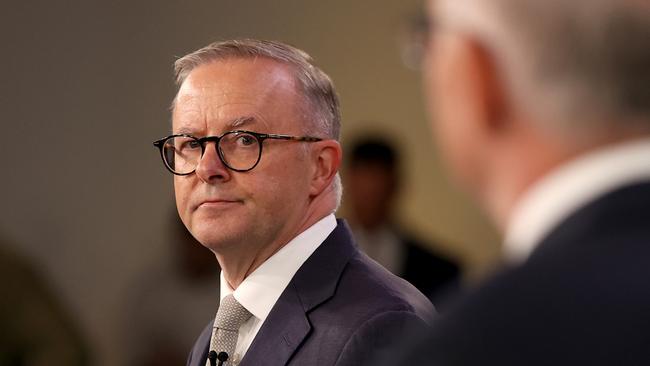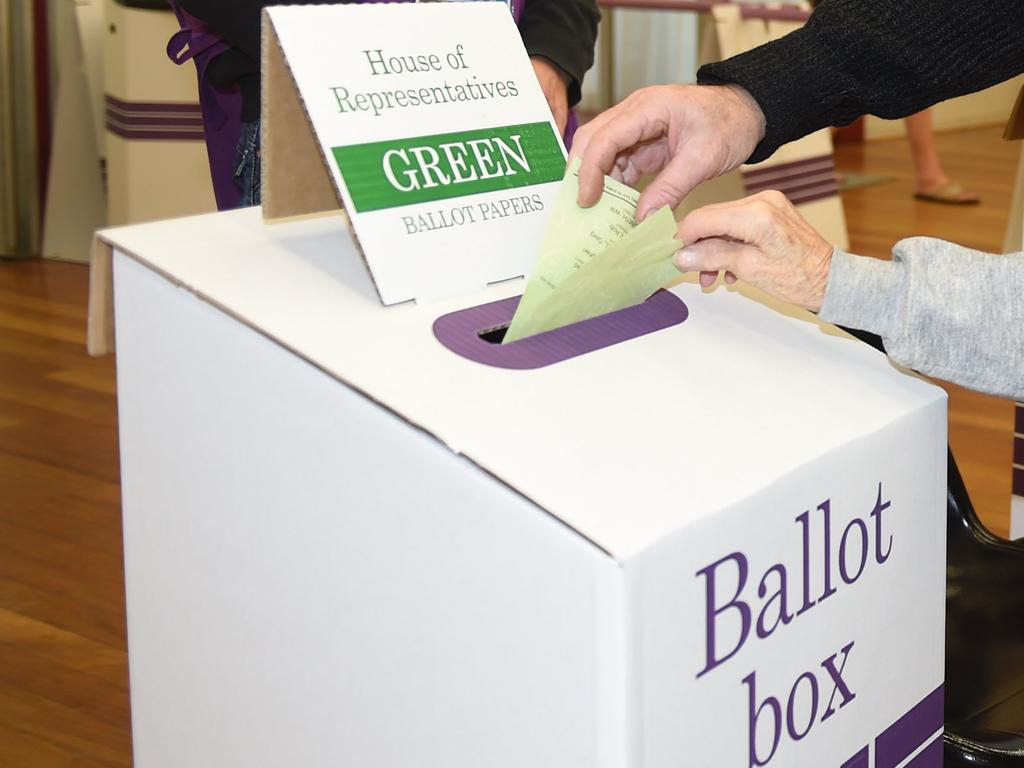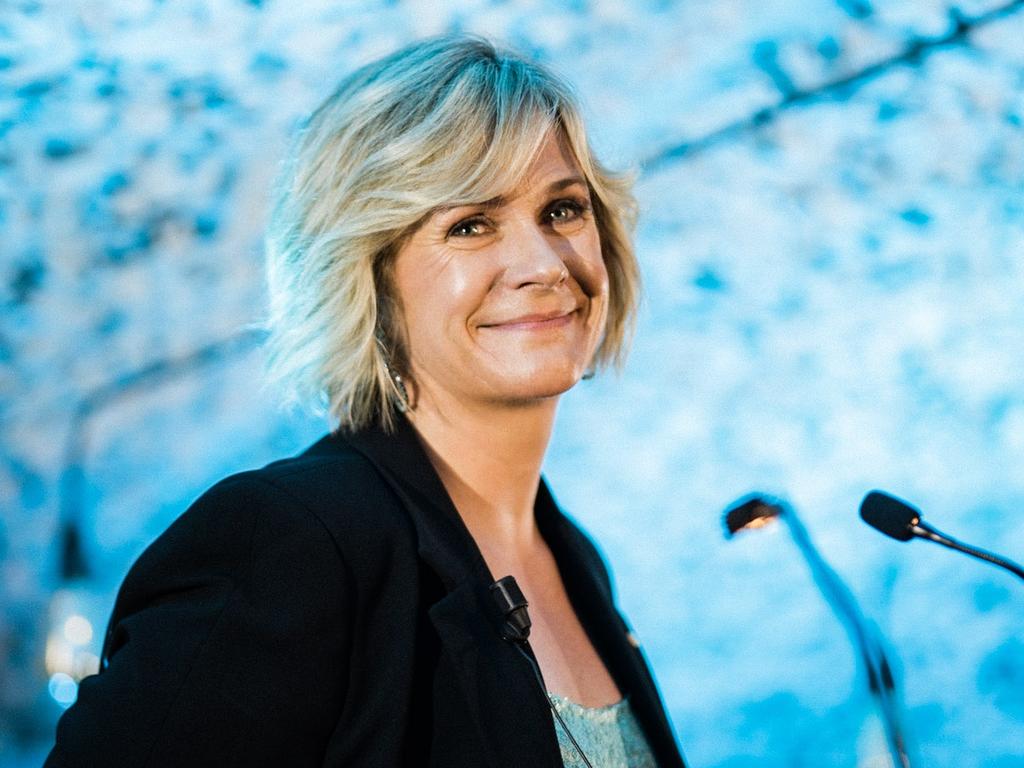Federal election 2022: Warning over Labor’s ‘stealth carbon tax’
Labor has been accused of planning a carbon tax by stealth with its policy to cut emissions from major industrial polluters as the climate wars ignited new political brawls.

Labor has been accused of planning a carbon tax by stealth with its policy to cut emissions from major industrial polluters as the climate wars ignited new political brawls despite a bipartisan commitment to achieve net-zero emissions by 2050.
After Anthony Albanese pledged there would be no carbon tax “ever” if he became prime minister, Whitehaven Coal chief executive Paul Flynn warned that Labor’s plan to drive down emissions in the industrial sector was a “carbon levy by stealth”.
As Labor’s climate plans faced the blowtorch, splits widened in Coalition ranks, with Nationals senator Matt Canavan describing the ambition of net-zero emissions by 2050 as “dead’’, backing fellow Nationals MPs and candidates who had claimed it was “flexible’’.
“The net-zero thing is all sort of dead anyway,” Senator Canavan told the ABC. “Boris Johnson said he is pausing it. Germany is building coal and gas infrastructure. Italy’s reopening coal-fired power plants. It’s all over.”
The Prime Minister was forced to clarify that the government stood behind its commitment to net-zero emissions by 2050 as Liberal MPs facing challenges from Climate 200-backed independents including Dave Sharma in Wentworth and Trent Zimmerman in North Sydney repudiated the Nationals’ comments.
“Our commitment to net zero by 2050 is a commitment of the Australian government that I made in Glasgow. It is the government’s absolute policy,” Mr Morrison said while campaigning in central Queensland.
With Labor facing growing questions about the impact of its policy after mixed messages from frontbenchers, Mr Flynn took aim at a centrepiece of its emissions-reduction plans — the safeguard mechanism — which will impose tighter limits on industrial polluters to force greater carbon cuts over the rest of the decade.
“It certainly looks as if some in the ALP want to turn an emissions-reporting mechanism into a carbon levy by stealth, all while claiming the policy position is pretty much the same as the existing government scheme,” Mr Flynn said.
“Those two things can’t be true at the same time. The fact the ALP sees such an enlarged role for the Clean Energy Regulator in negotiating with impacted facilities suggests some in Labor are only just beginning to turn their minds to what this policy might look like in practice and what the impacts could be across the economy.”
Opposition energy spokesman Chris Bowen said on Sunday coalmines would be forced to comply with Labor’s more stringent safeguard mechanism, after assistant climate change spokesman Pat Conroy last week said no coalmine would be affected by the policy.
The safeguard mechanism was created by the Abbott government and captures facilities that emit more than 100,000 tonnes of carbon a year, including 60 coalmines. It has been criticised by climate groups for doing little to enforce a lower carbon footprint from major emitters.
Labor will move to bring steeper emissions-reduction requirements for major industrial emitters, with its modelling saying it will deliver 213 million tonnes of emissions reductions by 2030.
“Emissions covered by the safeguard mechanism have grown 7 per cent since its commencement in July 2016, rising to 140 million tonnes in 2020-21,” Labor’s modelling says. “Under current policy, covered emissions are projected to grow to 151 million tonnes by 2030 to be 27 per cent above 2005 levels.”
Under Labor’s version of the safeguard mechanism, the cap for the 215 biggest industrial emitters will be progressively lowered to put the nation in line with Mr Albanese’s target to lower emissions by 43 per cent on 2005 levels by 2030. Companies that exceed “baseline limits” will need to offset emissions through carbon credit purchases, predicted to be about $24 per tonne of carbon.
Mr Albanese on Tuesday echoed former prime minister Julia Gillard’s infamous pledge in the 2010 election campaign in declaring there would be no carbon tax under his government. “There will be no carbon tax ever,” Mr Albanese told 2GB radio.
Ms Gillard broke her promise after the 2010 election when she did a deal with the Greens to implement what she described as a “tax”.
Mr Morrison said Labor’s plan to reform the safeguard mechanism would lead to fossil fuel companies being penalised and taxed.
“The carbon credits scheme that Labor has put in place, just to be clear, it not only affects the coal industry, it affects mining and oil and gas production,” Mr Morrison said. “It affects rail freight. It affects cement production. It affects fuel refining. And many other sectors are caught up in those arrangements which would see them penalised and taxed.”
On Tuesday, Mr Conroy said he did not regret saying coalmines would not be impacted by Labor’s policy “because it’s true”.
“The policy very clearly stated that when the Clean EnergyRegulator looked at the trajectories for each of the facility, they would take into account two factors: one, the available technology, and emerging technology to allow that facility to reduce its emissions; and, very importantly, the comparative constraint that their international competitors face,” Mr Conroy said.
“The coalmining industry will not suffer a disadvantage or a negative impact compared to their international competitors.
“And that’s further confirmed by our independent and comprehensive economic modelling that made it very clear. That found that not a single coalmine would close early because of our policy, and not a single coalmining job will be lost because of our policy.”
While Labor has confirmed coalmines will be part of its safeguard mechanism, it has promised trade exposed sectors will be at no disadvantage to international competitors. Labor will decide in government how each facility will drive down emissions based on the advice of the Clean Energy Regulator.
Whitehaven Coal, which last month sold 70,000 tonnes of coal to the federal government as part of a donation to energy-starved Ukraine, is committed to net-zero emissions by 2050 and is a member of the Minerals Council of Australia. The chairman of Whitehaven Coal is Mark Vaile, a former Nationals MP and deputy prime minister.








To join the conversation, please log in. Don't have an account? Register
Join the conversation, you are commenting as Logout